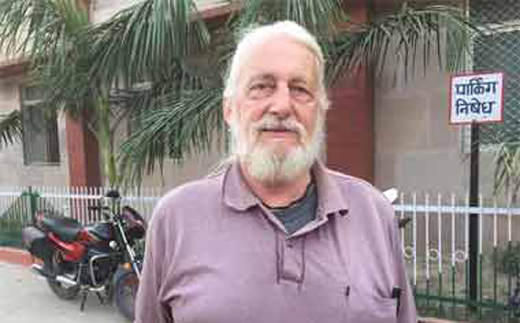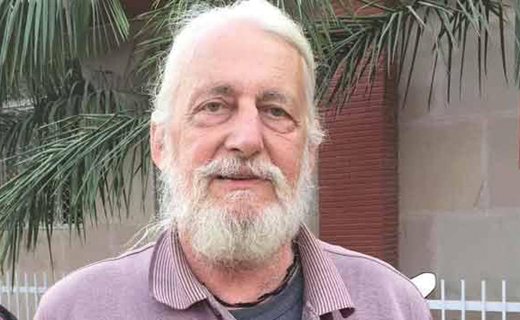Message for Modi from an Englishman in Varanasi: Leave my city alone
Mangalore Today News Network
Varnasi, May 16: Christopher Burchett, a 67-year-old doughty Englishman who has been living in Varanasi since 1970 and now knows its history, culture, lanes and by-lanes better than many Banarsi babus - has a pretty straight-forward message for its VVIP MP: leave Varanasi alone.
“Trying to turn Varanasi into Kyoto is an exercise in futility”, Burchett told Firstpost. This even as Varanasi Mayor Ram Gopal Mohle, District Magistrate Pranjal Yadav, Municipal Commissioner Umakant Tripathi and a host of state and central government officials returned from a week-long tour of the Japanese model heritage city Modi wants to transform Varanasi into.
“I don’t want to decry Mr Modi’s ideas but it doesn’t make much sense to me. Varanasi’s facilities should be improved rather than trying to recast it,” Burchett said.

Burchett doesn’t think that having Modi as Varanasi’s representative is such a big deal. "His (Modi’s) arrival hasn’t made such a big impact. It’s a mere fact that he is representing Varanasi in Parliament. I see no great changes. Varanasi has been a BJP stronghold and won elections here since the Janata Party days. Earlier it was Kamalapati Tripathi’s fiefdom. After Rajiv Gandhi’s rout, it became a saffron stronghold and continues to be one.”
And he’s skeptical about just what changes can be made to the historic town.
“I’m not sure how he can change the face of Varanasi except superficially. The whole charm of Varanasi is in its historicity and the religious character of the place. Varanasi doesn’t need to be industrialized. You can’t industrialise Puri or Dwarka either. There is no place for Adanis or Ambanis in Varanasi, except to put some money in the civic infrastructure," Burchett said.
“I can’t see six-lane highways running through the heart of Varanasi. The charm of Varanasi has always been its maze of narrow and winding lanes. And that has to be preserved at all cost,” he said.
Burchett speaks flawless Hindi and Bhojpuri to boot, which is quite an achievement for a Brit born in north Wales. Educated in the University of London, where he earned his History degree, Burchett headed to India through the overland route via Europe and the Middle East.
Arriving in India 45 years ago, he roamed from Kashmir to Kanyakumari taking in the sights and sounds of Delhi, Mumbai, Bangalore, Kolkata, Puri, Chennai, Cochin and Madurai before settling down in Varanasi. He recalls getting involved in “overlapping activities like teaching and studying” until he landed a job in a primary school to pay his bills.
In 1982, he met Geeta Choudhury, who had come to join the school he worked in, but after she failed to get through asked him to teach her English. What began as English lessons in the afternoon at Geeta’s home, ended in marriage in 30 days flat.

“I was surprised by how quickly it happened. It didn’t happen so fast even in the West, let alone in India”, said Burchett about marrying Geeta, who is 11 years younger than him. The couple have two daughters – Bhumika and Roohi – and a son Romi. His four grandchildren are the apple of his eye. However, Burchett has retained his British nationality.His Indian visa is renewed every five years.
Burchett now works as an editor in a publishing firm in Varanasi, which produces books on subjects like Hinduism and mythology. Geeta works for the New India Assurance Company and they live in a rented house which was built opposite the landmark Durga Kund more than 100 years ago.
So what’s Burchett’s take on the controversial ghar wapsi campaigns that have been run in the state?
“Rubbish! If someone who is born and brought up as a Muslim because six generations ago his forefathers converted to Islam, how can you expect him to become a Hindu? The Vishwa Hindu Parishad and Bajrang Dal’s case is very weak. Similarly, the offspring of a Christian family which converted 100 years ago can’t be expected to become a Hindu once again.It’s not humanly possible.
“On the one hand you say Vasudhaiva Kutumbakam, or the world is my family. And on the other hand you want to make an issue out of Hindu, Muslim and Christian. All very trite and childish,” Burchett said.
Burchett is a witness to Varanasi’s evolution over four and a half decades. “I was attracted by the happy go lucky way of life – taking things as they came. That’s no longer the case. Time is money. Everything is related to money now.”
“For the first 14-15 years, there was no TV set in my Varanasi home. TV arrived just in time for Indira Gandhi’s assassination in 1984 – the first TV tower was erected around that time." he said.
"Besides TV, the other big influence was the influx of rich Biharis into Varanasi who wanted to escape the lawlessness and kidnappings in Bihar. Their arrival resulted in skyrocketing land prices. And now the Bihari mafia itself is buying into Varanasi as it has blossomed into the biggest mandi in entire eastern UP. Patna and Gorakhpur are also important trading centres but not as important as Varanasi,” he said.
So what are Burchett’s expectations of Modi as a Banarsi to the core?
"To be honest, I have bigger expectations of him as the country’s PM rather than Varanasi’s MP. He must create jobs. He must fulfill as many promises as he can.. He must make India proud – and he shouldn’t forget his roots," Burchett said.
- Mangaluru: Commissioner denies misuse of police vehicle during Waqf protest, cites medical emergency
- Belthangady: Autorickshaw overturns near Ujire; driver seriously injured
- Chikkamagaluru: KSRTC driver attempts suicide over alleged harassment by senior officer
- Former don Muthappa Rai’s son injured after being shot at in moving car near Bidadi house
- Mulki: Top portion of Bappanadu temple chariot collapses during Rathotsava; none hurt
- Belthangady youth slips to death in Cauvery river
- Kundapur: Speeding Omni fatally knocks down pedestrian
- Snehalaya and Janamaithri Police launch anti-Drug awareness drive at Uppal and Hosangadi
- Mangaluru: Fight will continue till amendments to Waqf Act are withdrawn, say Muslim leaders
- Direction to remove Janivara would have come with the knowledge of the govt., says Poojary
- JEE (Main) second edition results to be announced by April 19: NTA
- Three arrested for raping woman in Mangaluru, say police
- Summer rush: Special trains, Vande Bharat sleeper announced for Mangaluru
- Honour to speak with PM Modi, will visit India later this year: Elon Musk
- India tears into Yunus regime over Hindu leader’s killing in Bangladesh
- Two homeguards suspended for asking students to remove sacred thread at Shivamogga college
- Caste census report politically motivated, says R Ashoka
- PM Modi to visit Saudi Arabia from April 22-23
- 4 dead, many feared trapped as building collapses in Delhi’s Mustafabad
- Kerala teacher acquitted as student confesses fake rape allegation
- CET officials booked for asking students to remove sacred thread at exam centre in Shivamogga
- BJP worker found hanging in Bengaluru outskirts, video message names ‘local leader’
- CET row: Karnataka govt orders probe after students asked to remove sacred thread
- Man who flashed woman, assaulted 7 people arrested in Bengaluru
- FIR against Sunny Deol, Randeep Hooda for offending Christian religious sentiments in Jaat
- Skills and Competencies Take Center Stage at MSN Dialogue Series
- Court remands Maoist Lakshmi to six-day police custody
- Sandhya Shenoy honored with Society for Materials Chemistry Medal-2024
- White Cornus Apartment in Mangaluru
- City girl wins first place in state-level spell bee competition
- Alleged ‘Love Jihad’ Case in Mangaluru: Woman left home voluntarily, says police
- Girl fatally struck by reckless two-wheeler near Belman
- New residential complex for the judges inaugurated in Mangaluru
- Absconding accused nabbed after 8 years
- Truck with cylinders turns turtle in Beltangady
- Bhoota Kola artist dies of cardiac arrest
- Development of the country should be our goal: Ganesh Karnik
- Container truck gets stuck under Modankap railway bridge
- Truck crushes bike’s pillion rider near BC Road
- Head constable dies of heart attack
- CITY INFORMATION
- TRAVEL
- TOURIST INFORMATION
- HEALTH CARE
- MISCELLANEOUS




 Write Comment
Write Comment E-Mail To a Friend
E-Mail To a Friend Facebook
Facebook Twitter
Twitter  Print
Print 


